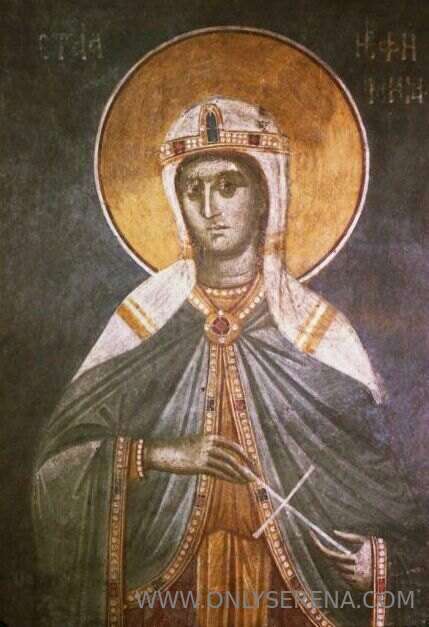


♀️ Feminist Friday ♀️ Jefimija Jefimija (1349–1405), secular name Jelena Mrnjavčević daughter of Vojihna and widow of Jovan Uglješa Mrnjavčević, is considered the first female Serbian poet. Her Lament for a Dead Son and Encomium of Prince Lazar are famous in the canon of medieval Serbian literature. Her works are embroidered texts which follow in a rich tradition of embroidery among Serbian noblewomen, thus making the beginning of Serbian women’s writing closely connected to textural practices. Born as Jelena Mrnjavčević around 1349, she was taught to read and write in Serbian and Greek and learned fine embroidery. She married Emperor Dušan the Great’s son Uglješa, then a ‘despot’ (ruler, emperor) in 1365. Sadly, Uglješa was killed during the battle on river Marica in 1371, a crucial stage in Ottoman’s conquest of the Balkan. Jelena, only 22 when her husband died, had already lost her only son before that. Jelena went to Milica and Lazar’s royal court in Kruševac, a city soon to become a mythical place of Serbian culture because of the approaching Battle of Kosovo. This battle would become yet another blow in her unhappy life, because Lazar, whose hospitality she relied on, was killed during the battle. Jelena and her distant cousin duchess Milica became nuns, taking on the names Jefimija and Jevgenija. Jefimija’s first known work is engraved on a gilt plaque on a little diptych (6,5 x 7,7 cm) of a small icon, which was supposed to be a gift to her son on his christening by the metropolitan of Serres. The text is dated sometime between 1369-1371 and can be seen as the beginning of Serbian women’s literature. Basically, the text expresses her grief for her dead son. Her next known work is an embroidered text for the Hilandar Monastery at the Holy Mount Athos. Her most significant literary work is the embroidery for the cover of the reliquary containing Duke Lazar’s remnants in the Ravanica Monastery. The cloth measures 99 x 69 cm and is embroidered with gold plated silver thread. The text of the Appraisal of duke Lazar is translated into English by Celia Hawkesworth and can be found in Voices in the Shadows: Women and Verbal Art in Serbia and Bosnia (Hawkesworth, 2000, 83). Nowadays, the embroidered cover of Duke Lazar’s reliquary is kept in the Museum of Serbian Church. ***** Disclaimer: It is important to remember that some of the women you will read about during Feminist Friday will have done unsavory, bad, and sometimes even terrible or unforgivable things during their lives. I have decided to include any women found to be problematic rather than disregard them entirely because I believe that it would be a disservice to do otherwise. The different women discussed here have lives that span over thousands of years during which life on Earth and humanity in general changed immensely and unrecognizably. Some of their values will be outdated. Some will be laughable. Some offensive. However, I implore you to try and look at these women as individual members of a world made to tame, shame, shackle, subjugate, abuse, and kill them. Do not ignore the horrors of the past. You are free to dislike them (I dislike many!) but recognize their achievements within the context of their time and place in the world.
